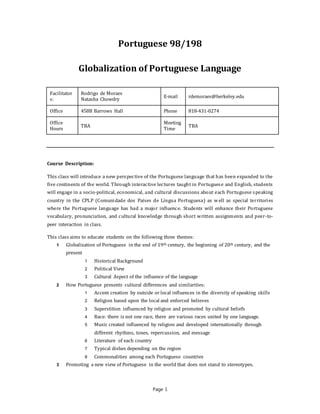
Globalization of Portuguese
- 1. Page 1 Portuguese 98/198 Globalization of Portuguese Language Facilitator s: Rodrigo de Moraes Natasha Chowdry E-mail rdemoraes@berkeley.edu Office 458B Barrows Hall Phone 818-431-0274 Office Hours TBA Meeting Time TBA Course Description: This class will introduce a new perspective of the Portuguese language that has been expanded to the five continents of the world. Through interactive lectures taught in Portuguese and English, students will engage in a socio-political, economical, and cultural discussions about each Portuguese speaking country in the CPLP (Comunidade dos Países de Língua Portuguesa) as well as special territories where the Portuguese language has had a major influence. Students will enhance their Portuguese vocabulary, pronunciation, and cultural knowledge through short written assignments and peer-to- peer interaction in class. This class aims to educate students on the following three themes: 1 Globalization of Portuguese in the end of 19th century, the beginning of 20th century, and the present 1 Historical Background 2 Political View 3 Cultural Aspect of the influence of the language 2 How Portuguese presents cultural differences and similarities: 1 Accent creation by outside or local influences in the diversity of speaking skills 2 Religion based upon the local and enforced believes 3 Superstition influenced by religion and promoted by cultural beliefs 4 Race: there is not one race, there are various races united by one language. 5 Music created influenced by religion and developed internationally through different rhythms, tones, repercussion, and message 6 Literature of each country 7 Typical dishes depending on the region 8 Commonalities among each Portuguese countries 3 Promoting a new view of Portuguese in the world that does not stand to stereotypes.
- 2. Page 2 Text: Apostila of important authors of each country: ● Zeezee copy. Course Objectives: 1 Expose the globalization of Portuguese language; 2 Introduce and multicultural connection between Portuguese speaking countries 3 Enhance the students vocabulary, pronunciation, and cultural knowledge about famous authors of the Portuguese world. Upon completion of this course you will: 1 Understand the value of intercultural competency. 2 Vanish the international ignorance about Portuguese countries and broaden your view about Portuguese. 3 Amplify your vocabulary and enhance your speaking skills. 4 Become more self-aware of certain differences that exist between groups. 5 Attain a greater desire to go further in the language. Method of Instruction: 1 The facilitators will lead the course with activities that promote in-class participation. In addition, lectures and discussions about each country and territory will be included throughout the semester. Furthermore, facilitators will invite guest lecturers to this course to enhance the student’s learning experience. Course Policy: Please arrive on time and be prepared to learn. Attendance is mandatory and the completing the reading prior to class is your responsibility. Students are not only expected but also required to participate in the course. If you feel like it is difficult for you to participate, please contact your facilitator for alternative ways to earn participation points. Students must contact the instructor via email in the case of an excused absence within 24 hours of the missed class.. Laptops, tablets, cell phones, and other electronic devices are NOT ALLOWED during class time. Let’s keep focus and interest on the class. Please respect your classmates, speakers, and your facilitators by turning off these devices before you enter the class. Reflection Paper: Details will be announced later in the course. Final Paper: The final paper will consist of an essay in Portuguese (for Portuguese students) or in English (for non-Portuguese speaking students) about their knowledge and understanding of the cultural differences and similarities from the beginning to the end of the class.
- 3. Page 3 Grading Policy: For students who are taking 2 units: Participation-----------------------------------------------------------------------------------------------------------40% Final Paper Examination (2-4)-------------------------------------------------------------------------------------30% Oral Presentation ----------------------------------------------------------------------------------------------------20% Reflection Paper------------------------------------------------------------------------------------------------------10% For students who are taking 3 units: Participation----------------------------------------------------------------------------------------------------------30% Final Paper (4 -6 pages)-------------------------------------------------------------------------------------------30% Oral Presentation----------------------------------------------------------------------------------------------------30% Reflection Paper-----------------------------------------------------------------------------------------------------10% NOTE: Students will be taking this course on a Pass/No Pass basis. In order to obtain a passing grade, students will need to accumulate at least 70%. However, missing two or more classes without a valid excuse will result in an automatic grade of NP. In addition, students who fail to take the midterm examination will result in a grade of NP as well. Course Schedule: Please note that this is a tentative class schedule for general reference only. This schedule may change in order to accommodate speakers. Week 1: Países Lusófonos: Class Introduction: Syllabus, Course requirements and expectations, project and paper instructions. What is the value of the Portuguese language? Week 2: Língua Portuguesa. Introduction of the History of the Portuguese Language Expansion of Portuguese to all 4 continents Importance of the Portuguese culture. Week 3: Portugal Historical Points: Colonization/ 24 April 1974 Cultural Expansion Week 4: Angola/ Mozambique Artistic Expression: Woman condition exposed by Alda Lara War influences in Mozambique’s culture Week 5: Guiné-Bissau / São Tomé e Príncipe Libertation of Guiné-Bissau Almada Negreiros the painter.
- 4. Page 4 Week 6: Cabo Verde Migration Cesária évora “Queen of Morna”, “Barefoot Diva” Week 7: Timor-Leste/ Other Portuguese speaking territories Writer: Fernando Sylvan Territories: Goa, Damão, Diu, Macau, and Guiné Equatorial Week 8: “Bate-Papo” Week 9: Brasil History and Portuguese influence 5 regions Week 10: Brasil Rio de Janeiro: The beauty and the reality Week 11: Final Paper Due Oral Presentation / TBD